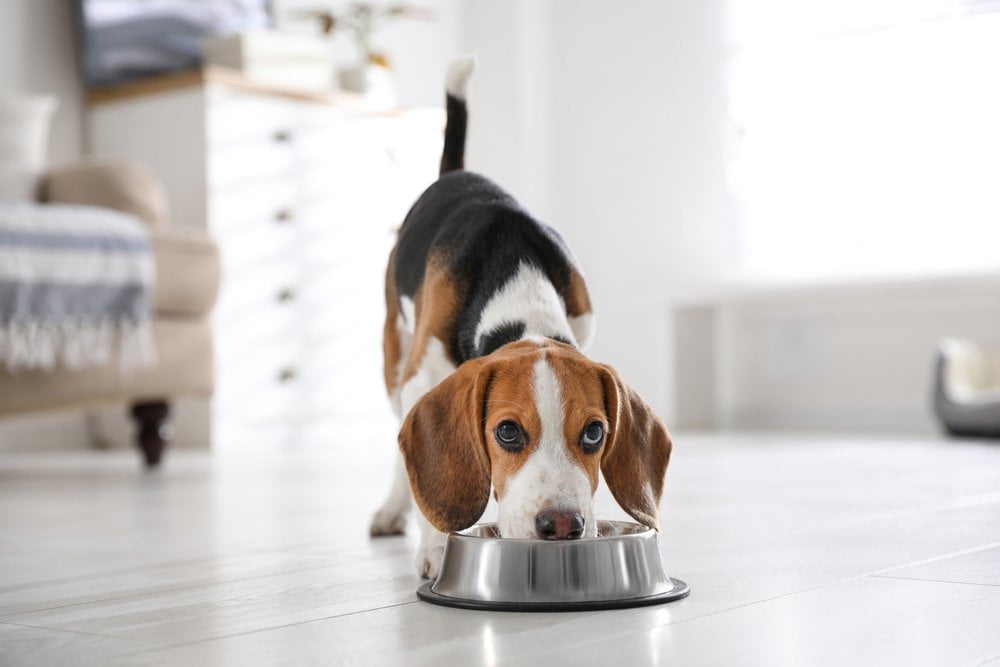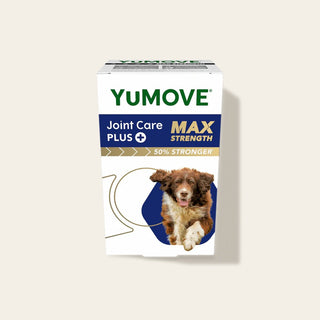

What to give a dog with an upset stomach
We've all been there – that moment of panic when you're digging through your pockets for a spare poo bag after your pup surprises you with an unexpected runny mess on your morning walk!
Joking aside, it can be a worry when your dog has an upset tummy, and you want to help them as quickly as possible. That’s why, in this guide, we share our top tips on how to care for a dog with an upset stomach, so you can help them feel better and get them back to their usual happy self!
How to tell my dog has an upset stomach?
Just like us, dogs can get an upset tummy when something's not quite right in their digestive system. Signs vary depending on how bad the tummy upset is but could include:
- Soft or slimy poop or diarrhoea
- Vomiting
- Listlessness
- Loss of appetite
- Drooling
- Restlessness
- High temperature
- Increased need to poop
- Trembling or shivering
- Belching, wind, gas or excessive tummy noises
- Straining to go to the toilet (especially if poop is watery)
Your pup may also have stomach pain if they cry when you pick them up.
Causes of upset stomachs in dogs
Lots of thing can cause stomach problems in dogs. These include eating things they shouldn’t have, a sudden change of diet, stress or eating human food that’s not safe for dogs.
Other potential causes for a dog’s upset stomach include:
- Food allergies: Some dogs are intolerant to certain food allergens – some examples include beef, chicken and certain carbohydrates.
- Allergies or reactions to medications
- Stress: When the body goes into hyper-alert, it can affect the tummy.
- Eating too fast: Lots of dogs gobble up their food at warp speed. To prevent this, try using a slow feeder.
- Bacteria, viruses or parasites
- Medical issues: Serious conditions like liver or kidney disease, stomach ulcers, pancreatitis, inflammatory bowel disease and cancer can cause stomach upsets.
- Poisoning: As dogs are notorious scavengers, poisoning in dogs can cause severe stomach upsets.
One possible cause of tummy upsets is gastroenteritis (inflammation/irritation in the stomach and intestines). In many cases, the symptoms clear up within a day or two. But if they carry on or you have any concerns, you should speak to your vet for advice.
How to help a dog with an upset stomach
If your dog is off their food, it’s important to do your best to keep them hydrated. A low sodium bone broth can help entice them to drink if they seem uninterested. Feed a bland diet in small amounts every few hours to avoid overloading the digestive system.
Allow your dog to rest and take them out to the garden as often as they need to avoid accidents in the home. Once your dog’s tummy improves, gradually reintroduce their usual food in small amounts, if you have tried something different whilst they are unwell.
What food to give a dog with an upset stomach?
If you’re unsure what to give a dog with an upset stomach, it’s best to try and stick to their regular food, as any change can cause further digestive upset.
That said, some dogs do well with small amounts of plain, boiled, skinless chicken off the bone. To reduce the change for your dog, you could also add a little chicken to a small portion of their usual food to encourage them to eat.
Scrambled eggs and plain boiled rice are another option. Probiotics for dogs can also help restore gut flora, so can be a useful addition once your dog is eating.
If you’re unsure what to feed your dog when they have a stomach upset, your vet will have diet suggestions – often ones developed to support your dog’s tummy.
When to see a vet
If you were wondering, ‘Why is my dog’s poo soft?’ and when you need to call a vet, here’s the answer.
If your dog is vomiting, passing blood, has slimy stools or seems unwell in themselves, it’s sensible to contact your vet for advice as soon as possible.
How will the vet help?
Depending on the severity of your dog’s tummy upset, the vet will check vital signs like temperature and hydration status, blood pressure, heart rate and gum colour (a poorly dog has pale gums). The vet may suggest electrolytes, probiotics, medications and a suitable diet.
How to help prevent upset stomachs
To help reduce the change of your pup from getting an upset stomach in the future, try these tips:
- Introduce new foods and treats slowly
- Feed a daily probiotic for dogs
- Use a slow feeder to stop your dog guzzling their meal
- Check for and remove toxic plants and chemicals in the house and garden
- Watch your dog closely on walks to stop them picking up nasties in the undergrowth
The Takeaway
At some point, your pup will likely get an upset tummy – it happens! The key is catching it early before it gets serious. Start with a bland diet, make sure they’re staying hydrated, and keep an eye on their energy levels. If things don’t improve within 24-48 hours or if you have any concerns, it’s a good idea to check in with your vet for advice.
To help keep your dog in tip-top condition discover YuMOVE's health guides for expert advice on pet care.




